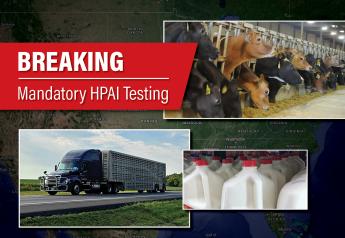Why Calves Need Water In Winter

It’s challenging to feed water to young dairy calves in the freezing months of winter, but it’s also highly important.
The liquid diet of milk or milk replacer does not provide enough water to fuel proper digestive-system development, according to Dr. Jim Quigley, Calf and Heifer Research and Technical Manager for Provimi North America. “Milk or milk replacer does not constitute ‘free water,’ because it bypasses the rumen and reticulum and travels straight to the abomasum via the esophageal groove, which is active in calves until about 12 weeks of age,” said Quigley.
He further explained via his “Calf Notes” educational series that “free water” is necessary for rumen development, because the rumen bacteria that ferment feed in the rumen and covert it to volatile fatty acids (VFAs) need a water environment to grow. VFAs are critical to growing and developing the rumen. Without this critical water (and dry feed) intake early in life, rumen development will be slowed, and calves will not transition well to weaning.
Early life water consumption in calves both encourages starter grain intake, and enhances the rumen fermentation process to digest and convert it to valuable VFAs. Research on water availability to young calves has repeatedly shown that calves receiving access to free water eat more starter grain and gain more weight than those receiving liquids only via milk or milk replacer.
Kertz et al. (JDS 67:2964-2969) found that calves receiving water ate 31% more starter grain and gained 38% more weight in the first 4 weeks of life. Another study in the United Kingdom (Volac 2017) showed that, in the first 11 weeks of life, providing water versus no water yielded a 19% gain advantage for calves fed a conventional milk-replacer diet, and a 24% gain advantage for calves fed an intensive milk-replacer diet.
Unfortunately, the average age at which U.S. dairy producers begin to offer calves free-choice water – according to the most recent USDA statistics – is about 17 days. Quigley and other industry experts would like to see that happen much sooner, as early as the first day of life.
While very young calves will drink little water at first, its availability is important so they can become accustomed to having access to it. Unfortunately, that can be a challenge in the winter, but no less important. University of Minnesota Dairy Extension Educator Jim Salfer offers the following advice for winter water feeding:
• Offer warm water immediately after calves are finished with their milk; empty pails after 10 minutes to prevent from freezing.
• As an alternative, offer warm water for short periods daily at times separate from feeding.
In either case, it is important to provide the water at a consistent time every day, so calves get used to the routine. And despite cold ambient temperatures, calves maintain a body their body temperature and rumen temperature at 101.5-103.5˚F. Warming the water to a similar temperature will draw less energy reserves from the calves to regulate these internal temperatures.
Rumen Development, Don't Wean Calves Without It!
A Pound Of Prevention For Hypocalcemia







